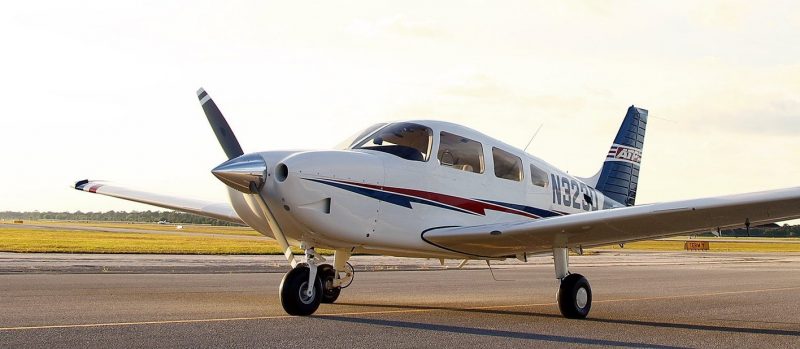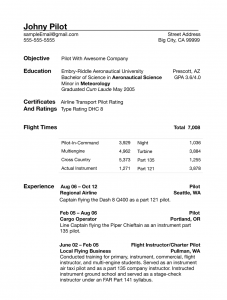11 Tips for Landing Your First Pilot Job

You have a newly minted commercial pilot license and are ready to storm the job market! But it can be difficult getting your first pilot job. Even when there is a pilot shortage like now, employers will often want or need experience before they hire a pilot. This catch 22 is difficult when you need your first job in order to get experience to get a pilot job. Following are some ideas to increase your chances.
1) Getting a Flight Instructor Certificate Is Your Best Bet
Flight instructing is the most widely available low time pilot job. After you’ve spent all your effort getting through your commercial certificate you may not want to hear more certificates might be necessary, or you may not like the idea of teaching for work. But your best chance of landing an entry level job is as a flight instructor. And future employers see it as a positive mark on a pilot’s resume when they have flight instructing experience. Going the flight instructor route will not only set you up for current success but also future success.
2) Don’t Stop Your Flight Training
Get as many endorsements and ratings as your finances will allow. Fly as many different types of airplanes as you can. Any additional work you put in here will be more value and qualifications you bring to a potential employer.
3) Research the Pilot Job Market
You need to know where the jobs are and what employers are looking for. Don’t just stick with the geographical area you live in as this will limit your opportunities and the chance of finding the right employer. Having a clear picture of what additional experience or qualifications you need to be competitive for a position will get you into it that much faster.
4) Consider How You Are Approaching Employers

Has your job search consisted of just sending in your CV to random employers? This is more often annoying to them than anything. Pick up the phone, or even better drop in for a chat if you can make it to them, for an in-person chat. Even if an employer doesn’t have a job opening available to the public yet, they might be in the early stages of hiring another pilot. If you make a good impression the worst that can happen is the employer will have you in mind when their next vacant position opens up.
5) Networking is The Key
Given the choice, companies prefer pilot applicants who have a recommendation from a current employee. They are taking less of a risk on that person. Many jobs will be filled through word of mouth without ever being listed as available to the public. Get active in the aviation community. Find aviation events and organizations and volunteer opportunities to participate in. Rub shoulders with whoever you can – not just pilots or pilot managers. Stay in contact with your flight instructors – they are also working their way up through the pilot career and are just ahead of you in career advancement.
6) Expand Your Non-Flying Skills
Many entry level pilot employers are small businesses. You are more valuable to them if you can do more than just fly an airplane. Work on your non-technical skills such as customer service, office administration, or book keeping. Some larger employers may need help in regulatory/safety management areas. You could be more useful to the larger employers if you are good at policy implementation or technical writing.
7) Create a Professional Pilot Resume and Cover Letter

A professional and well written resume is the key to getting your foot in the door. You will be judged by the attention to detail and work you put into your employment paperwork. Your cover letter is an opportunity to present information not covered in your resume and should tell the employer who you are and why you want to work for them.
8) Treat Each Communication With a Potential Employer As An Interview
Each time you correspond with a person at a company you are being evaluated. That person might be judging your qualifications, your positive traits, or whether they want to work with you. Even if a person is not directly involved with the hiring decision they will likely pass along impressions to those who are. Make sure to always be professional and polite.
9) Teach Yourself to Relax
You will perform better and leave a better impression with an employer if you learn to relax when conversing with them. Remember, if an employer is talking with you they want you to have their open position and are trying to find the reasons why you are a good fit. Know your value and what you bring to the table. It might be worthwhile to practice interviews with people close to you, or to look into pilot interview preparation services.
10) Research the Employer
Employers will like you as a candidate more if you show genuine interest in their company. They want to know that you aren’t just shotgunning applications with little actual interest in working the job. Be prepared to tailor your answers to that employer and the job requirements.
11) Keep a Positive Attitude
Job searches can be stressful and draining. And it can become discouraging if your search takes longer than expected. If you let this sour your attitude it may carry over into your conversations with potential employers and decrease your chances of getting a job. Know that many people before you have worked through finding jobs in more challenging hiring markets than what exists now. The key to landing your first pilot job is maintaining a positive attitude and a willingness to persevere.
Greg started his professional pilot journey in 2002 after graduating from Embry Riddle. Since that time he has accumulated over 8,000 hours working as a pilot. Greg’s professional experience includes flight instructing, animal tracking, backcountry flying, forest firefighting, passenger charter, part 135 cargo, flying for a regional airline, a national low cost airline, a legacy airline, and also working as a manager in charge of Part 135 and Part 121 training programs.



